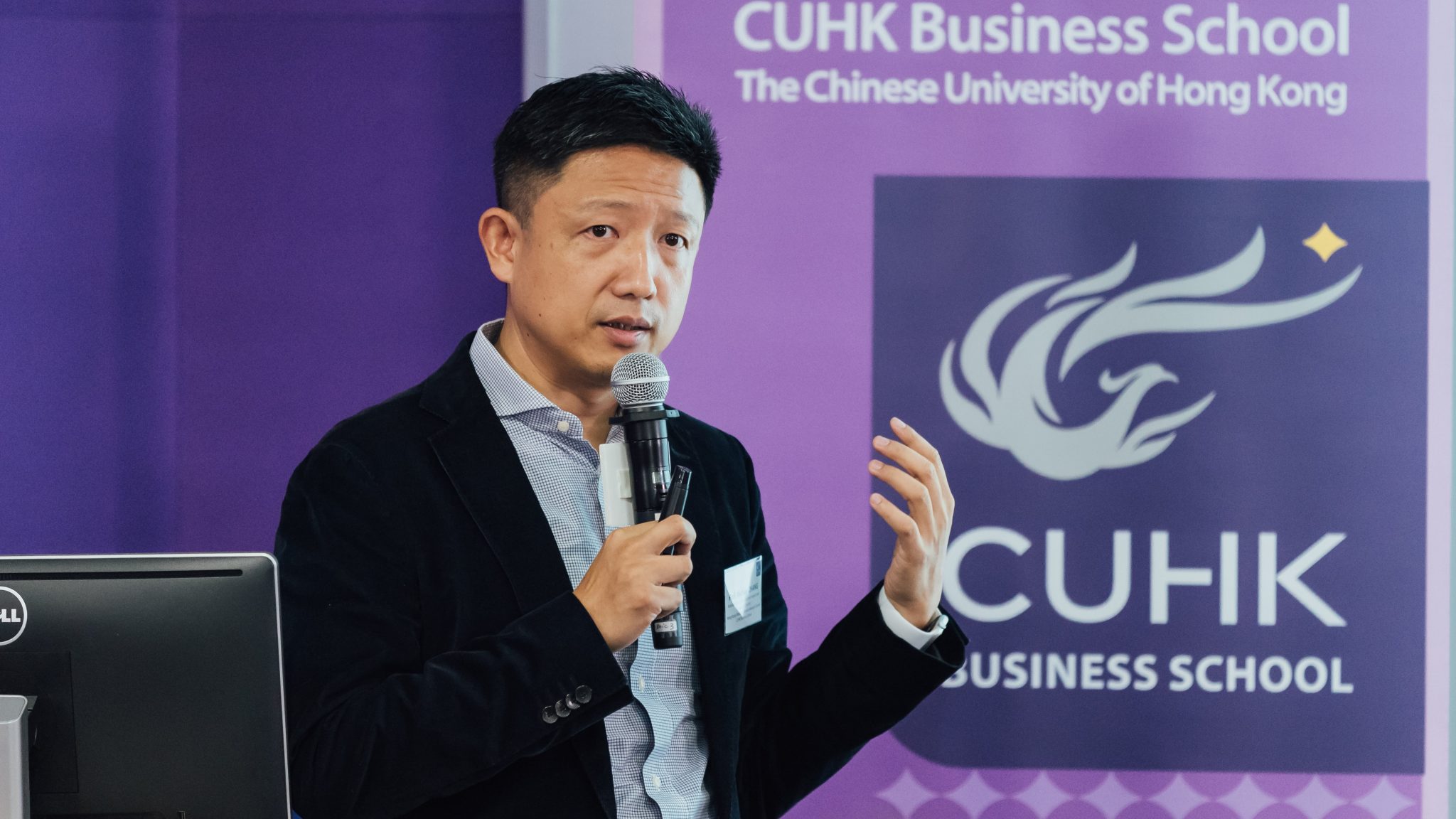Communicating and Connecting the University with Businesses

Appointed in summer of 2018 as Associate Dean (Innovation and Impact), Michael Zhang, Professor of Department of Decision Sciences and Managerial Economics at The Chinese University of Hong Kong (CUHK) Business School, shared about his thoughts on research, teaching, school leadership and corporate partnerships. He talks about innovation, business models, and how luck has a huge role to play in business success.
Prof. Michael Zhang completed his undergraduate at Tsinghua University back in 1996 majoring in two languages – English and Computer Science. He chose English because it was the language that could connect him with the world, and Computer Science allowed him to communicate with machines. The ability to communicate with both people and machines brought him from Beijing to Boston and eventually to Hong Kong, influencing both his personal and professional life.
Those were the emerging years of the “World Wide Web” and Prof. Zhang found out that Beijing Telecom, a subsidiary of China Telecom, was inviting people to sign up for its first 200 email accounts. Dialing up to the internet in 1993 through his phone line at home, Prof. Zhang got his first email account, as well as a RMB2,000 phone bill – an astronomical figure in those days which his mother reprimanded him for. What was dubbed as teenage curiosity sowed the seeds of innovation that went on to pave his personal and professional development for the next two decades.
“As an academic, I often remind myself that the university is a part of society, which is why academia needs to be a part of society rather than work in a silo, and to think about how our research can create an impact on our communities.” —— Prof. Michael Zhang
After completing his undergraduate studies, Prof. Zhang had short stints with 21Vianet, the first internet data centre set up in China, as well as China United Holdings as an investment banking consultant, both giving him exposure to real life applications of technology and confirming his approach in choosing research topics based on usability. With an increasing interest to understand the impact of information technology on marketing including products, behavior of both buyers and sellers, advertising, search engine and the ensuing financial returns, Prof. Zhang went on to do his Masters of Science in Management with Tsinghua University and completed his PhD in Management at MIT Sloan School of Management, writing his dissertation on “Tapping into the Pulse of the Market – Essays on Marketing Implications of Information Flows”.
Two decades on since his PhD, Prof. Zhang continues his research and collaboration with companies, expanding his interests of studying about the influence of IT in marketing to IT in finance. “As an academic, I often remind myself that the university is a part of society, which is why academia needs to be a part of society rather than work in a silo, and to think about how our research can create an impact on our communities. This is the principle I use when choosing my research projects as well, which is why I love communicating and connecting the university with businesses.” One similar theme for Prof. Zhang’s work is that he focuses on data and experiments with it to build models, “Businesses succeed because they find the right model that works, and the businesses that sustain are the ones who have been able to replicate that model.”
Prof. Zhang shared about a project with the Chinese internet-related services and products company Baidu back in 2016-2017, on how they were looking to use advanced artificial intelligence technology to improve its business model. Similar to many of his past collaborations with the private sector, this opportunity came about by chance, when one of his contacts at Tsinghua University who is an advisor to Baidu reached out to him to see if he could help. His project studied the behavior of advertisers who placed bids on Baidu’s search engine, and after analysing 70TB of data and helped develop new algorithms which enabled Baidu to be able to set a minimum cost on marketing keywords, ultimately increased the company’s revenue by 26 per cent.
“Data only tells correlation, it takes a lot of experimenting to find out the causal relationship and that’s what makes data useful,” Prof. Zhang explained about the core element of his work. He believes the financial sector has so much that it can do with all the data it has, “Banks are in the very early stages of leveraging the data they have and apply it across their business. I am also bullish about blockchain and bitcoin.”
In early 2019, he will be teaching students of MSc in Management and MBA in Finance programmes on courses such as financial data analysis, FinTech and entrepreneurial finance. The objective of the FinTech course is to educate students about social impact that FinTech businesses should and can create, while equipping them with foundational programming skills that students will be able to use even in their personal daily lives. The entrepreneurial finance course, a rather straightforward curriculum, covers the basics of how to raise capital for entrepreneurial ventures and improve start-ups’ valuation.
“Businesses succeed because they find the right model that works, and the businesses that sustain are the ones who have been able to replicate that model.” —— Prof. Michael Zhang
Touching on the topic of entrepreneurship and how the idea of starting a business or becoming part of a start-up seems to be all the rave these days, Prof. Zhang did not shy away from sharing about his successes. “I’ve been lucky to have a few successful businesses, and I’ve also experienced a lot of failures which I see as a good thing. There’s always something to learn from failures.”
He admitted that next spring will be a challenge as he will be teaching executives in the EMBA (Chinese) programme about the strategic value of IT in transforming traditional business, given how many of these executives are already very successful in their own rights.
Unsuspectingly, Prof. Zhang attributes much of his success to luck. “Ultimately, luck is the key factor in whether a business succeeds or not, more so than any other skills. You can try to apply every lesson you learn from books or successful entrepreneurs, but never underestimate how luck is the ultimate element that decides if your business will take flight.”


